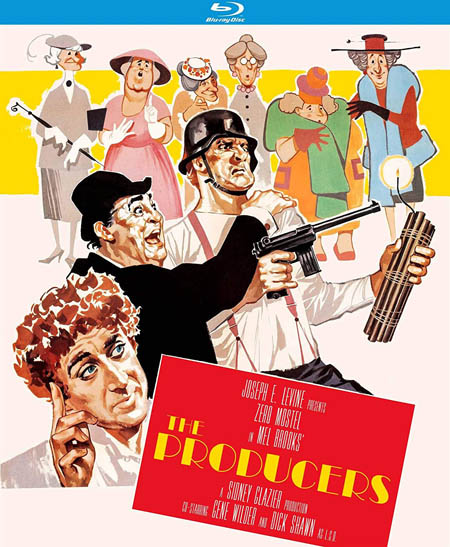
THE
FLOP THAT WASN'T
By
Raymond Benson
Most
folks today may be familiar with The Producers, the Broadway musical
comedy that ran for years, toured around the globe, and elicited laughter and
joy for audiences of all ages. There are likely less people today who have
experienced the original 1967 film upon which the successful musical is based.
For decades, though, the movie was all we had.
In
the mid-sixties, Mel Brooks was a successful television writer, having worked
on hilarious comedies with Sid Caesar, among other works, and later the
co-creator of Get Smart. Brooks then came up with what was first
intended to be a novel, then a play, and finally a screenplay called Springtime
for Hitler—an outrageous satire lampooning the Nazis. The Hollywood
producers to whom Brooks pitched the piece were appalled. No audience would accept
a “comedy†about Hitler. Fortunately, one producer, Sidney Glazier, got the
joke and agreed to take on the project. Brooks had never directed before, but
he convinced Glazier that the producer would save money if he allowed the
screenwriter himself to direct. Realizing he was taking a big chance already,
Glazier agreed on the condition that the title be changed. The script became The
Producers.
The
story concerns an unscrupulous has-been Broadway producer named Max Bialystock
(Zero Mostel) who seduces little old ladies to get them to “invest†in his
productions, which always fail. His accountant, Leo Bloom (Gene Wilder),
realizes that Bialystock would make more money with a flop than with a
successful show. The two men team up to produce the worst Broadway show ever
seen in New York. This odd couple buys the rights of a play called Springtime
for Hitler, written by neo-Nazi numbskull playwright Frank Liebkind
(Kenneth Mars). They hire the worst Broadway director ever, Roger De Bris
(Christopher Hewett), and cast the completely incompetent and spacey Lorenzo
St. DuBois (Dick Shawn), known as “L.S.D.†to his friends in the lead role as
Hitler. The producers are off and running.
The
movie had its premiere in Pittsburgh in late 1967 and was a disaster. The
audience didn’t get it. The studio, Embassy Pictures, wanted to pull the movie
and not release it. It was destined to be a flop that never even opened. Leave
it to Peter Sellers to come to the rescue. Sellers had originally been
considered for the part of Leo Bloom, but for some reason he was nowhere to be
found when the time came to officially cast the picture. Nevertheless, he saw a
screening of The Producers and published a review in Variety that
praised the movie. Embassy then had second thoughts, and the film opened for a national
run in March 1968 (thereby qualifying it for the ’68 Oscars).
The
Producers was
controversial at first. There were mixed reviews, including many big-name
critics who trashed the film. But others, like Sellers, saw the genius of the
comedy, and enthusiastically recommended it. Brooks’ flop became a hit, and
over the years grew to be a cult favorite that epitomized the type of movie for
which Brooks became known in the 1970s.
Granted,
looking back at The Producers today, a viewer may not be in for a
totally smooth ride. The film is indeed clunky and somewhat amateurishly directed.
The acting can be sometimes abrasive. More disconcerting are the moments of
politically incorrectness that were intentional—but funny—at the time… today,
however, they are not only politically incorrect but also possibly offensive
(not the Nazi stuff, but rather the blatant sexism and lampooning of homosexual
and trans characters). Nevertheless, this is classic Mel Brooks material, and
he has never been one to treat an audience with kid gloves.
For
the record, Brooks won the Oscar for Best Original Screenplay.
Both
Zero Mostel and Gene Wilder are over the top and are mostly wonderfully manic
in their performances. Wilder, especially, displays a solid gold persona that
was new to the screen (he was nominated for a Best Supporting Actor Oscar for
his portrayal). In fact, everyone in the movie chews the scenery, but the
ensemble fits with the outrageousness of the proceedings.
Kino
Lorber’s new Blu-ray restoration looks the best this reviewer has ever seen The
Producers on home video—much improved over the previous DVD release. There
is an informed audio commentary by filmmaker/historian Michael Schlesinger that
goes into the picture’s history and antics. Supplements are ported over from
previous home video releases: an hour-long “making of†documentary that is
quite good; an outtake sequence; a gallery of design sketches; a short video of
filmmaker Paul Mazursky reading Peter Sellers’ Variety review; a radio
spot; and theatrical trailers for this and other Kino Lorber releases.
The
Producers may
be a relic of its time, but it is gem that its fans will always adore. The Springtime
for Hitler production sequence is comedy gold and is worth the price of
admission. Mel Brooks would indeed become more accomplished as a filmmaker, but
there is no question that The Producers was the milestone that assured
him a career in feature films.
CLICK HERE TO ORDER FROM AMAZON